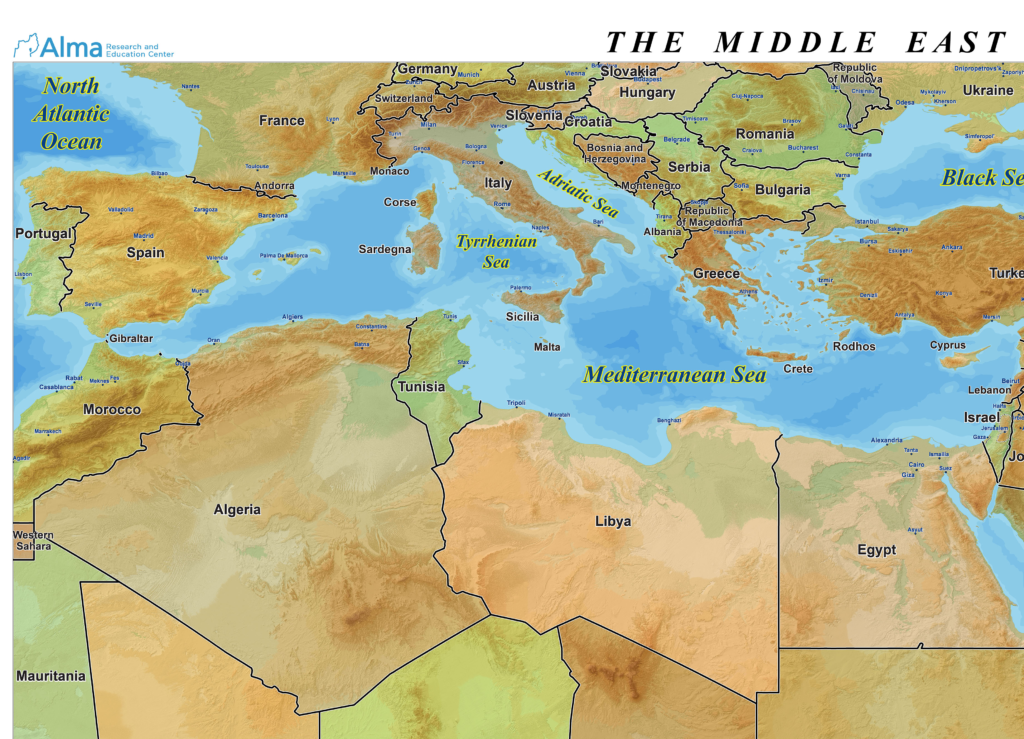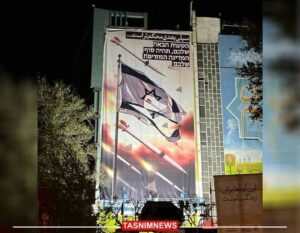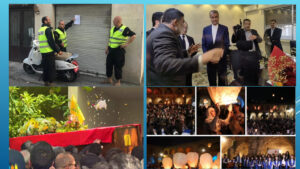As the clandestine contacts between Israel and Libya continue (according to various reports), Cairo is acting to weaken the opposition from neighboring countries in order to strengthen normalization developments and establish a regional defense alliance. This policy, which complements the Egyptian efforts, mediated by members of the presidential council at the Libyan Political Dialogue Forum, is likely to be a fundamental element in the emerging front against terrorist organizations and other countries striving to destabilize Libya.
In light of the Libyan High Council of State’s activities, the involvement of Russia and the European countries, alongside the activities of the U.N. envoy to Libya, Stephanie Williams, many are optimistic that a solution to ending the political crisis in Libya is within reach. Since the fall of Muammar Gaddafi (October 2011), Libya’s dictatorial ruler since 1969, the country has been subjected to ongoing instability caused by Arab uprisings throughout the region, especially in Yemen, Libya, and Syria. Morocco, the leader of the North African countries, and Egypt are promoting the broad Middle East defense alliance and seeking to initiate a more open approach between Israel and the North African countries. As of this writing, the first public visit by the IDF Chief of Staff to Morocco is underway…
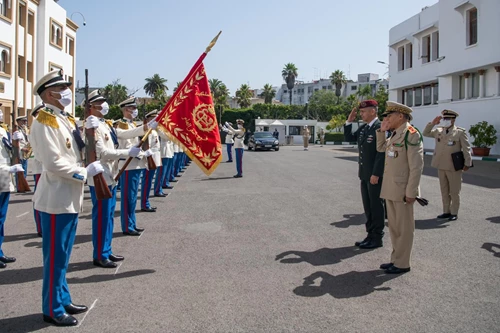
The weakening of the Islamic State in Iraq and Syria and the growing flow of jihadi operatives who have found refuge in Libya are also having an impact. In 2017, a series of attacks were attributed to terrorists who came from Libya, including the attack on the Copts south of Cairo, in which 29 people were killed, and the attack in the area of al-Wahat, which according to unofficial reports, claimed the lives of more than 50 Egyptian police officers.[1] In this context, Jerusalem and Cairo share a common goal to undermine the spread of jihadi organizations in Libya.
The Egyptian Foreign Ministry recently urged senior Libyan officials at several meetings to take advantage of the opportunity to join forces to create a unified domestic and foreign policy.[2] Despite the ethnic division in Libya and the division into provinces and areas of influence, the Egyptians are taking advantage of their status and influence to stabilize the country. Thanks to this, Israel may also be integrated into the fabric of Libyan interests. Egyptian influence is mainly through local tribes[3] and through prolonged involvement against terrorism.
One of Libya’s main challenges is achieving uniformity and dealing with the terrorist proxies that promote the recruitment of volunteers to fight within the country. Libya seeks to deal adequately with external threats but also to receive better intelligence coverage and economic assistance from Western countries,[4] which will be possible by reaching understandings with the regional countries, including Israel.
Like other countries engaged in civil war, the Libyans are familiar with the modus operandi of the terrorist organizations in their territory. However, as a terrorist organization becomes more entrenched, its recruitment pattern becomes systematic, and the organization’s available recruitment reservoir increases. This allows it to accumulate more resources and consolidate the organization’s operational capabilities.[5] Libya is attempting to end this trend and stabilize the country’s political situation.[6] This has been the case to a limited extent in the context of al-Qaeda’s affiliates,[7] at least since 2014, which focused on recruiting volunteers from engineering colleges, and as ISIS specifically attempted to recruit volunteers from medical teams, engineers, and computer science researchers.
In this context, it is believed that Israel had good intelligence coverage on the activities of the organizations in North and East Africa. In this respect, Chad has forged ties and strengthened its relations with Israel, mainly due to the conflict in northern Chad, close to the Libyan border. When the relations between Chad and Israel were established, the Israeli newspaper Makor Rishon reported that in the African press, the reports dealt mainly with the fact that “Israel will help President Déby in his fight against the rebels in northern Chad.” It was further stated that …” Renewing ties with Chad could perhaps advance the regional dialogue with Egyptian President el-Sisi. Egypt shares a common border with Libya, and it and Israel have a common interest that weapons from Africa in general and from Chad, in particular, will not spill over into Libya and Egypt and from there to Sinai and Gaza.[8] Libya has also shown great interest in this area. Israel has previously sent military advisors to Chad to assist it and has succeeded in establishing a good basis for mutual cooperation. According to foreign reports, during the 1980s, Israel provided secret assistance in the form of military experts who advised the regime of then-President Hissène Habré in his war against the rebels and against the Libyan army that invaded the country. Israel also sold weapons to the Chadian army, although not in large quantities.[9]
Israel’s military advice was no exception, although approved by decision-makers. Israel’s assistance to Chad may indicate that Libya can cope well with the threats from offshoots of various terrorist organizations and groups when cooperating with Israel.
During the reign of Muammar al-Gaddafi, he appointed two former officers of the Central Intelligence Agency (CIA) (Edward Wilson and Frank Terpil), who were part of the Oceanic International Corporation for security consulting. In recent years, other organizations had worked for security consulting purposes on behalf of Middle Eastern countries at a time when chaos dominated several areas of control that frequently changed hands between different groups. But they did not always serve their purpose, and some acted with conflicting interests.
According to various reports, Libyan General Khalifa Haftar also received assistance from Israel via the mediation of the Egyptian regime, headed by President Abdel Fattah el-Sisi. Previously, Haftar was one of the generals close to Gaddafi. After being exiled to the U.S. in the 1990s, he became a U.S. citizen and worked for the CIA for over two decades.[10]
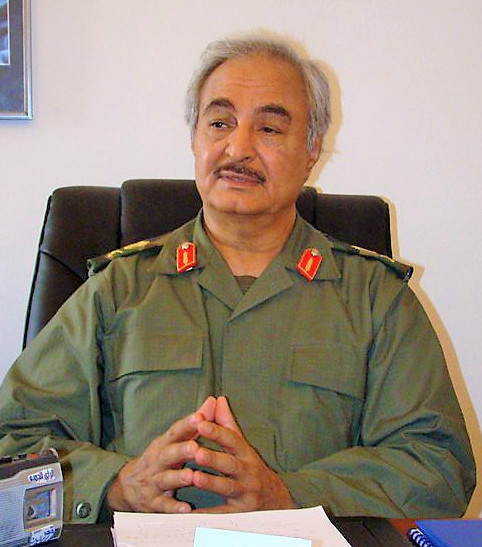
The Israeli newspaper Haaretz revealed that a French-made private plane that took off from Dubai and landed at Ben-Gurion International Airport on November 8, 2021, included Saddam Haftar, the son of Libyan General Khalifa Haftar. He had met with Israeli officials to discuss possible normalization.[11] The meetings also dealt with the intelligence and military nature of the relationship. The head of Israel’s intelligence services, David Barnea, and Libyan Prime Minister Abdul Hamid Dbeibeh also recently met in Jordan to discuss normalization and security cooperation.[12] The emerging cooperation also aims to protect the oil facilities in Libya and focus on Haftar’s attempts to maximize profitability from the global energy crisis that has evolved in recent months.
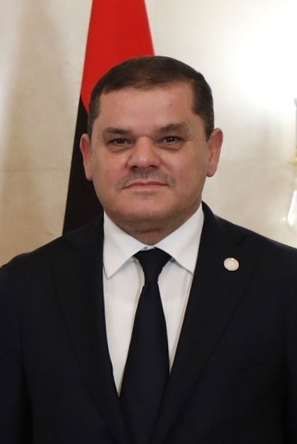
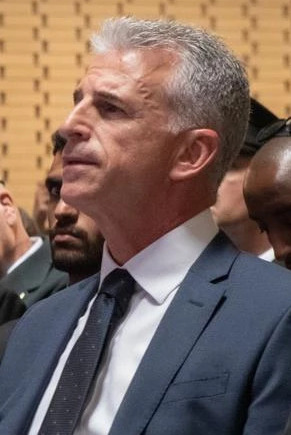
As mentioned above, what intimidates the Libyan leadership is the arrival of foreign fighters into the country through neighboring countries and breached borders. The chaos in Libya intensified their arrival. At the same time, the arrival of some of them is also made possible with the consent of the Libyan leadership. Opposition groups from Chad are operating in Libya together with Sudanese fighters previously recruited by Haftar.[13] Like them, Syrian fighters supported by Turkey were seen in government military camps in Tripoli,[14] while those affiliated with Haftar operated alongside fighters of the Russian Wagner force in the northern strategic city of Sirte and nearby Jufra.
In light of these efforts, Iran and its proxies are working on expanding their influence in North Africa, among other things, by providing funds and military aid.[15] These attempts show that Iranian influence in Libya is proof of the Iranian regime’s ambitions to increase its regional influence. In the past, the Israeli ambassador to the U.N. noted that the presence of Iranian weapons on Libyan soil violated international community resolutions.[16] However, its policy, carried out indirectly, makes it difficult to locate the source of the weapons, even if it is a cache of weapons from Syria originating in Iran. Moreover, Iran does not act openly and directly but acts covertly and indirectly through its protégés and allies.
Iran’s determination to deepen its grip is also made possible by Lebanese Hezbollah. In the past, U.S. officials announced that Hezbollah was laundering money for terrorist purposes in North Africa as part of Hezbollah’s financial system in Africa. Regarding this, Hezbollah operatives threatened Morocco,[17] after the arrest of Hezbollah financier who sent weapons and military operatives to train Polisario operatives in their guerrilla war against Morocco. All this alongside the establishment of commando units and the planning of terrorist attacks against Morocco.
Hezbollah cannot collaborate with the Polisario and transfer weapons from Algeria without receiving a green light from Iran. Confirmation of this comes from the actions of the cultural affairs attaché at the Iranian embassy in Algeria, Amir Mousavi, who served as the liaison between Hezbollah, Algeria, and the Polisario.[18] This is evidence of Iran’s ambition to gain increasing influence in North Africa. Unlike Morocco, Algeria has never had warm relations with the monarchies in the Gulf. Algeria has also restricted its ties with Riyadh, Abu Dhabi, and Qatar and is known for opposing the normalization with Israel by countries of the region.
In light of this reality and the growing tensions on the ground between rival militias that recently broke out in Tripoli, Israel will be able to contribute, together with the Arab countries that led the normalization agreements, to strengthen the stability in Libya. As Libya’s status strengthens in the face of destabilizing forces, the U.S. will also be able to accelerate its long-term policy of establishing a unified government in Libya, thus increasing its energy outputs.[19]
Alongside creating a window of opportunity, Libya will benefit from the efforts of international actors to inject capital into the country. Washington’s allies and the growing ties between Israel and Libya could also serve as a security guarantee to increase financial investments and prevent terrorist groups from entering the country from the Sahara belt.[20] Despite Libya’s protracted challenges, abandoning a political channel with Israel will lead to its continued vulnerability rather than prosperity. Regimes in the Middle East and the Muslim world understand this more openly, and the hope is that the Libyan leadership will also be able to take advantage of the window of opportunity to benefit from the profound changes in establishing a partnership with Israel.
[1] https://www.inss.org.il/he/wp-content/uploads/sites/2/2018/01/%D7%9E%D7%90%D7%9E%D7%A8-%D7%A9%D7%9C-%D7%A4%D7%95%D7%99%D7%A8-%D7%95%D7%99%D7%A0%D7%98%D7%A8-%D7%95%D7%A9%D7%95%D7%AA-%D7%9C%D7%90%D7%AA%D7%A8.pdf
[2] https://www.libyaobserver.ly/inbrief/egypt-dialogue-only-solution-libyan-crisis
[3] https://www.trtworld.com/magazine/libyan-tribes-their-loyalties-and-egypt-s-bait-explained-38300
[4] https://www.trtworld.com/magazine/libyan-tribes-their-loyalties-and-egypt-s-bait-explained-38300
[5] https://www.ispionline.it/it/pubblicazione/what-makes-libya-perfect-place-terrorists-12894
[6] https://www.wilsoncenter.org/article/libya-2021-islamists-salafis-jihadis
[7] https://irp.fas.org/world/para/aq-libya-loc.pdf
[8] https://www.makorrishon.co.il/international/96015/
[9] https://www.maariv.co.il/journalists/Article-672508
[10] https://www.france24.com/en/20140519-coup-leader-cia-asset-libya-general-Khalifa-haftar
[11] https://www.haaretz.co.il/blogs/yossimelman/2021-11-07/ty-article/.premium/0000017f-f8c0-ddde-abff-fce588ed0000
[12] https://www.israelhayom.com/2022/01/13/report-mossad-chief-lybian-pm-meet-in-jordan/
[13] https://www.france24.com/en/live-news/20220204-sending-mercenaries-to-libya-main-income-source-for-darfur-armed-groups-un
[14] https://www.rferl.org/a/pentagon-turkey-3-500-syrian-fighters-libya-russia/30734486.html
[15] https://atalayar.com/en/content/un-finds-iranian-weapons-libyan-conflict
[16] https://libya.liveuamap.com/en/2020/9-may-israels-ambassador-to-un-tells-jerusalempost-the-iranian
[17] https://jcpa.org.il/article/%D7%9B%D7%9A-%D7%A0%D7%95%D7%9C%D7%93%D7%94-%D7%94%D7%94%D7%9B%D7%A8%D7%94-%D7%91%D7%A1%D7%94%D7%A8%D7%94-%D7%94%D7%9E%D7%A8%D7%95%D7%A7%D7%A0%D7%99%D7%AA
[18] http://www.memri.org.il/cgi-webaxy/item?4753
[19] https://pemedianetwork.com/petroleum-economist/articles/geopolitics/2022/us-tries-to-ease-libyan-tension/

